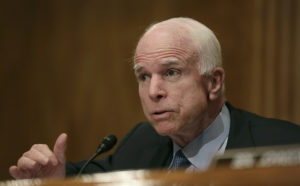
Senator John McCain November 30, 2016. U.S. Customs and Border Protection Photo by Glenn Fawcett
Writing in The American Conservative, W. James Antle III, remembers a time earlier in his career when Senator John McCain was more skeptical of putting America troops in harm’s way. Antle reminds readers of McCain’s skepticism of interventions in Bosnia, Somalia, and Haiti. He writes:
“The principal reason for invading Iraq, that Saddam had WMD, was wrong,” McCain wrote with his co-author Mark Salter. “The war, with its cost in lives and treasure and security, can’t be judged as anything other than a mistake, a very serious one, and I have to accept my share of the blame for it.”
For years after all of this became obvious, McCain didn’t in fact accept very much in the way of blame for it. Instead he heaped scorn on political rivals who opposed the decision to invade and attributed many of war’s dire consequences, including the emergence of ISIS
Earlier in his career, McCain was far more skeptical about the use of military force. He spoke out against a closely allied president of his own party, Ronald Reagan, on the dispatching of U.S. troops to Lebanon and continued to do so after the bombing of the Marine barracks in Beirut. In the early 1990s, he opposed repeating this error in Bosnia, arguing that we shouldn’t take sides in a foreign civil war because of the difficulty in “distinguishing between friend and foe.” He was against humanitarian interventions in Somalia and Haiti.
“I don’t think our vital national security interests are at stake,” McCain said in 1994. “In Haiti, there is a military government we don’t like. But there are other governments around the world that aren’t democratic that we don’t like. Are we supposed to invade those countries, too?”
An unfair criticism of McCain is that his choice of Sarah Palin to be his 2008 running mate encouraged the lower-brow forms of populism the senator would later lament, culminating in President Trump. While Palin had many flaws, the truth was the opposite—there needed to be more creative efforts by responsible Republican leaders to engage the base’s anger, not less.
The outpouring of grief that has followed McCain’s passing owes as much to the sense that a better political climate is being buried with him as it does to his military service. Some on the right now see McCain’s virtues—civility, graciousness in defeat, policing the Republican ranks against racial intolerance—as vices. The left last year vacillated between celebrating McCain and vilifying him in the cruelest imaginable terms based on whatever vote he was casting on Obamacare at the moment.
Let us emulate John McCain’s contributions to peace at home and chart a different course abroad.
Read more here.
If you’re willing to fight for Main Street America, click here to sign up for my free weekly email.





